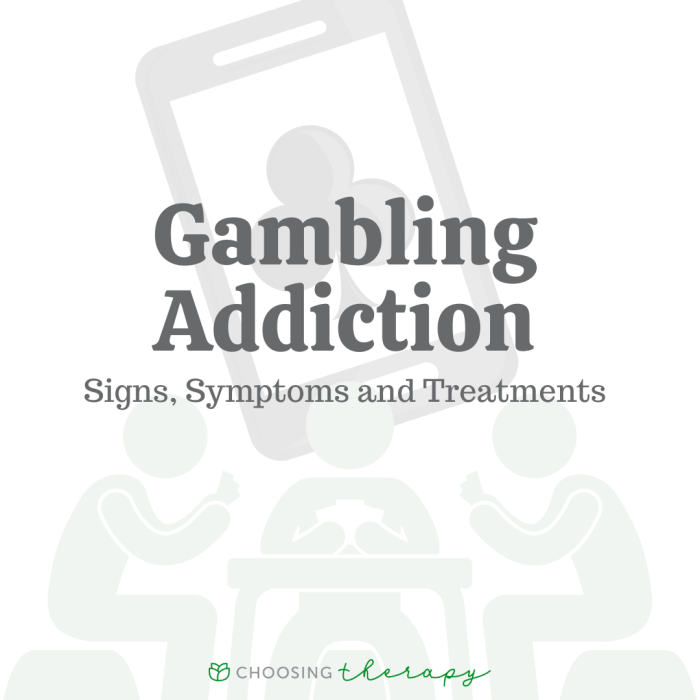
Understanding Gambling Addiction
Gambling addiction, often referred to as compulsive gambling, is a complex psychological condition that can significantly impact an individual’s life. It involves an uncontrollable urge to gamble, despite the negative consequences that may arise. Recognizing the nuances of gambling addiction is essential for understanding its implications on mental health and overall well-being.The primary distinction between casual gambling and gambling addiction lies in the individual’s ability to control their gambling behavior.
While casual gamblers may enjoy the activity responsibly, those with a gambling addiction find themselves unable to resist the urge, leading to detrimental outcomes. Common misconceptions about gambling addiction include the belief that it only affects individuals with poor financial management skills or that it is merely a lack of willpower. In reality, gambling addiction is a recognized mental health disorder that can affect anyone, regardless of their background.
Signs of Gambling Addiction
Identifying the signs of gambling addiction is crucial for early intervention and support. Individuals suffering from this condition often exhibit various psychological and behavioral changes.
- Increased preoccupation with gambling, often thinking about it even when engaged in other activities.
- Hiding gambling activities from friends and family, indicating a sense of shame or guilt.
- Feeling restless or irritable when trying to cut back on gambling.
- Chasing losses by betting more in an attempt to recover lost money.
- Neglecting personal and professional responsibilities as gambling takes precedence.
Emotional changes are also prevalent with excessive gambling. Individuals may experience heightened anxiety, depression, or feelings of worthlessness. Financial signs often include increasing levels of debt, borrowing money from friends or family, or even resorting to illegal activities to fund gambling habits.
Risk Factors for Developing Gambling Addiction
Various demographic and environmental factors can increase the likelihood of developing a gambling addiction. Understanding these risk factors is essential for prevention and intervention strategies.
- Demographic Factors:
- Age: Younger individuals, especially those between 18 to 24, are more susceptible.
- Gender: Males are statistically more likely to develop gambling problems than females.
- Socioeconomic status: Individuals with lower income levels may turn to gambling as a means of escape.
- Environmental Factors:
- Accessibility: The presence of casinos and gambling establishments in proximity can increase gambling behavior.
- Peer Influence: Friends or family members who gamble can normalize the behavior.
- Stressful Life Events: Situations such as divorce, job loss, or trauma can trigger gambling as a coping mechanism.
Personal characteristics that may predispose individuals to gambling addiction include impulsivity, low self-esteem, and a high tolerance for risk-taking behaviors.
Impact of Gambling Addiction on Daily Life

Gambling addiction can have severe repercussions on an individual’s personal relationships and day-to-day responsibilities.
- Personal Relationships: Those struggling with gambling addiction often face strained relationships with family and friends due to dishonesty and financial strain.
- Work Responsibilities: Frequent absences from work or a decline in job performance may occur as gambling takes precedence over professional duties.
- Health Issues: Compulsive gamblers may experience physical health problems such as insomnia, anxiety disorders, and substance abuse issues stemming from their addiction.
The impacts of gambling addiction extend beyond the individual, affecting their loved ones and the community at large.
Seeking Help for Gambling Addiction
Recognizing the need for help is a vital step for individuals grappling with gambling addiction. Several resources are available to assist those in need.
- Support Groups: Organizations like Gamblers Anonymous provide a community of support for individuals seeking recovery.
- Therapeutic Resources: Licensed therapists specializing in gambling addiction can offer personalized treatment plans.
- Hotlines and Online Resources: Many national and local hotlines offer immediate assistance and information.
Approaching a loved one about their gambling issues can be daunting. It is important to do so with compassion, understanding, and an open mind, focusing on concern for their well-being rather than judgment.
Prevention Strategies for Gambling Addiction
Preventing gambling addiction requires a proactive approach from both individuals and communities.
- Responsible Gambling Practices: Setting financial limits, taking breaks, and avoiding gambling when feeling stressed can help mitigate risks.
- Community Initiatives: Programs aimed at raising awareness about the risks of gambling can empower individuals to make informed choices.
- Educational Resources: Providing information about gambling addiction in schools and workplaces fosters a culture of awareness and prevention.
Implementing these strategies can significantly contribute to reducing the prevalence of gambling addiction within communities and promoting healthier attitudes towards gambling.
Recovery Process from Gambling Addiction
Recovery from gambling addiction is a challenging but achievable journey.
- Success Stories: Many individuals have overcome their gambling addiction, sharing their experiences to inspire others. These stories often highlight the importance of support and resilience.
- Therapeutic Approaches: Cognitive-behavioral therapy (CBT) and motivational interviewing are effective methods used in treatment, helping individuals identify triggers and develop coping strategies.
- Importance of Ongoing Support: Continued participation in support groups and therapy is crucial in maintaining recovery and preventing relapse.
The road to recovery is not linear, and having a solid support system plays a critical role in the healing process.